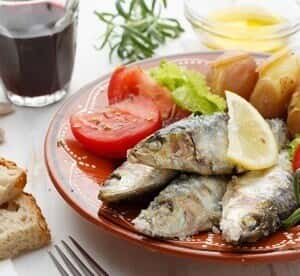
Most people have heard that a Mediterranean-type diet is good for their heart. There is a substantial amount of research supporting the cardiovascular benefits of this dietary approach. There is also growing evidence that the Mediterranean diet (MeDi) benefits the brain.
A study published in the journal Neurology (Oct. 21, 2015) provides a highly quantitative view of the brain and the impact of the MeDi on neurons. The investigators examined 684 older people (their average age was 80) by administering an MRI (magnetic resonance image) brain scan. They also collected detailed information about the food these volunteers were eating.
The Envelope Please!
Here are the conclusions of the researchers:
“Among older adults, MeDi adherence was associated with less brain atrophy, with an effect similar to 5 years of aging. Higher fish and lower meat intake might be the 2 key food elements that contribute to the benefits of MeDi on brain structure.”
What they actually found was that subjects who followed a MeDi-type eating pattern had bigger brains…13.11 milliliters larger on average, compared to those who did not follow a Mediterranean diet.
Is a Bigger Brain a Better Brain?
As people age their brains tend to shrink. Doctors call that atrophy. Neurologists don’t know why that happens, but smaller brains are associated with cognitive impairment and even dementia. On a population-wide basis bigger brains appear to be better brains.
Other Confirmatory Research
This research in the journal Neurology is exciting, but the investigators were only studying brain size and its relationship to diet. What about an actual study of diet and brain function?
Just such research was conducted in Spain in the Predimed trial (JAMA Internal Medicine, May 11, 2015). Over 400 older people were assigned either an olive oil-enriched MeDi or a low-fat diet. They were tested for cognitive function at the beginning of the study and again four years later. Those on the MeDi plus extra olive oil had better brain function whereas those on the low-fat diet slipped a bit.
The authors concluded:
“In an older population, a Mediterranean diet supplemented with olive oil or nuts is associated with improved cognitive function.”
What Is a Mediterranean Diet?
A lot of Americans think they know what this diet is all about, but they would be wrong. It’s not fettuccine Alfredo! It’s not a slab of salmon and some broccoli once or twice a month.
It is heavy on fish over meat. But what fish should you be eating and how should it be prepared? Trust us when we tell you that most of the people living in Mediterranean countries like Spain, France, Italy, Greece, Turkey and Tunisia are not eating salmon on a regular basis. And what about vegetables? Again, French fries (an American favorite) are not part of the Mediterranean diet.
In the Predimed study volunteers were given 4 tablespoons of olive oil daily. What are the chances you are consuming that much olive oil every day?
Practical Sources of Information:
To learn more about this dietary approach as well as our recommendations on eating healthy veggies and fruits, we suggest The People’s Pharmacy Quick & Handy Home Remedies. In addition to MeDi, you will get our version of a low-carb dietary approach with our dos and don’ts on veggies and fruits. Hint: Some of our favorites include asparagus, beet greens, bok choy, collard greens, snow peas and spinach. We also include a list of fish that should be a regular part of your diet.
You will find recipes from some of the country’s leading health experts including:
Crustless Cauliflower and Red Pepper Quiche, from Eric Westman, M.D., M.H.S.
Sole with Lemongrass Red Bell Pepper Salad from Mark Liponis, MD
Wheat Berry Saldad, from Jeffrey Blumberg, PhD
Lentil Nut Loaf with Red Pepper Sauce, from Walter Willett, M.D., Dr.P.H.
If you would like our special Holiday Remedy Bundle, you can get Quick & Handy Home Remedies plus 50% off our book, Recipes and Remedies from The People’s Pharmacy at this link.
Bottom Line:
What you eat affects your health in profound ways. That is a message you have heard on The People’s Pharmacy Radio show for years and read in our books and on this website. Check out our article (September 17, 2015) about Olive Oil and Mediterranean Diet Against Breast Cancer. You will be astounded with the results. There is no drug that works so well.
Perhaps this latest study from the journal Neurology will encourage you to start making some fundamental dietary changes to preserve your brain power for as long as possible.

